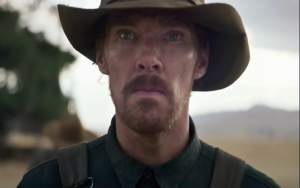THE POWER OF THE DOG: 3 ½ STARS. “beautifully crafted film.”
 “The Power of the Dog,” now playing in theatres before making the move to Netflix, is a story of self-loathing that is equal parts straightforward and exasperating. Much like its main character Phil Burbank (Benedict Cumberbatch), the movie has moments of interest but is ultimately frustrating.
“The Power of the Dog,” now playing in theatres before making the move to Netflix, is a story of self-loathing that is equal parts straightforward and exasperating. Much like its main character Phil Burbank (Benedict Cumberbatch), the movie has moments of interest but is ultimately frustrating.
The film begins in mid-1920s Montana. The Burbank brothers, Phil (Cumberbatch) and George (Jesse Plemons), are wealthy ranchers and polar opposites. The only thing they seem to have in common is a reverence for their mentor, the deceased rancher Bronco Henry.
Phil, we learn, studied the classics at Yale, but prefers to live a basic life. He likes the company of horses and the ranch hands, rarely bathes and is quick with a cruel remark.
George is a gentleman rancher. He wears suits, topped with a bowler hat, throws dinner parties at the family home and falls in love with Rose Gordon (Kirsten Dunst), a widowed restaurant owner with a gay son named Peter (Kodi Smit-McPhee) who wants to study medicine like his late father. Although he says he’s happy not to be alone, George takes Rose for granted and she turns to the bottle.
Rose’s presence brings out the worst in Phil who takes every opportunity to belittle his brother’s new wife, and catcall her son. Peter is a quiet presence on the ranch during his school break, but as time goes on, it is clear he sees himself as his mother’s protector. “When my father passed, I wanted nothing more than my mother’s happiness,” Peter says. “For what kind of man would I be if I did not help my mother? If I did not save her?”
“The Power of the Dog” isn’t so much driven by its narrative as it is by the characters and an intense central performance.
As Phil, Cumberbatch is an enigma. An unwashed and gravelly-voiced bully, his guard is constantly up. Cumberbatch and director Jane Campion slowly reveal bits of Phil’s backstory through subtle references and scenes. We never get a full picture, and fear of revealing spoilers prevents me from elaborating, but it appears the character’s self-loathing and fragile masculinity seem to drive his vile behaviors. Cumberbatch maintains the mystery of the character, while allowing the odd slip of vulnerability appear, even if it sometimes feels as if he’s playing a studied caricature of a cowboy.
Campion delivers the material in a slow burn. Tensions build, but the level of repression on screen prevents total engagement with the characters. By the time the end credits roll “The Power of the Dog” proves itself to be a beautifully crafted film with a handful of emotionally affecting scenes but an underwhelming overall effect.
